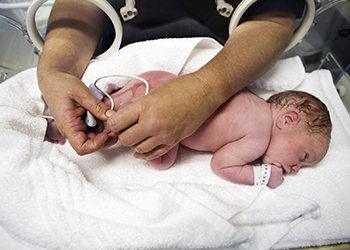
The issue
Depression occurs in an estimated 7% to 15% of all pregnancies and is widely recognized as a factor affecting birth outcomes and neonatal behaviors. However, the use of antidepressants to manage perinatal depression is not without risk to the baby.
Joint studies by the Departments of Pediatrics and Psychiatry, and the Human Early Learning Partnership, at the University of British Columbia, used population based linked data to examine the impact on babies when their mothers took serotonin reuptake inhibitor (SRI) antidepressants during pregnancy. The study was among the first to attempt to distinguish differences in babies born to women with depression who took prenatal SRI and women with depression who did not.
Data sources linked
- BC Vital Statistics Agency registry of births
- BC Ministry of Health Services hospital separation records
- PharmaNet registry of prescriptions
- BC Ministry of Health Services physician billing records
- BC Ministry of Health Services Medical Services Plan subscribers
- Statistics Canada
What did we learn?
- The incidence of pregnant women taking antidepressants is surprisingly high at 5%.
- Half the women who took antidepressants before they became pregnant stopped taking them when they learned of their pregnancy. Prevalence resumed after birth.
- Babies born to mothers who take SRI antidepressants are more likely to suffer respiratory distress and low birth weight.
- It is duration, not timing of gestational exposure that has an impact. The greater the length of gestational SRI exposure, the greater the risk for neonatal respiratory distress.
"A mother’s depressed mood and her antidepressant use during pregnancy are critical public health concerns that both shape a child’s developing brain and behaviour - long before birth. Separating the impact of treatment from the illness has been a real challenge and the use of population level linked health data has allowed us to study the influence of both factors in ways that makes BC a leader in this research area."
Tim Oberlander, MD, FRCPC, Professor, Division of Developmental Pediatrics, R. Howard Webster Professor in Early Childhood Development, Department of Pediatrics, University of British Columbia
Making a difference
- Contribution to a long and lively debate on the impact of effects of antidepressants on pregnant women and their babies.
- Providing valuable information for patients and physicians on the risks and benefits of taking antidepressants while pregnant.
